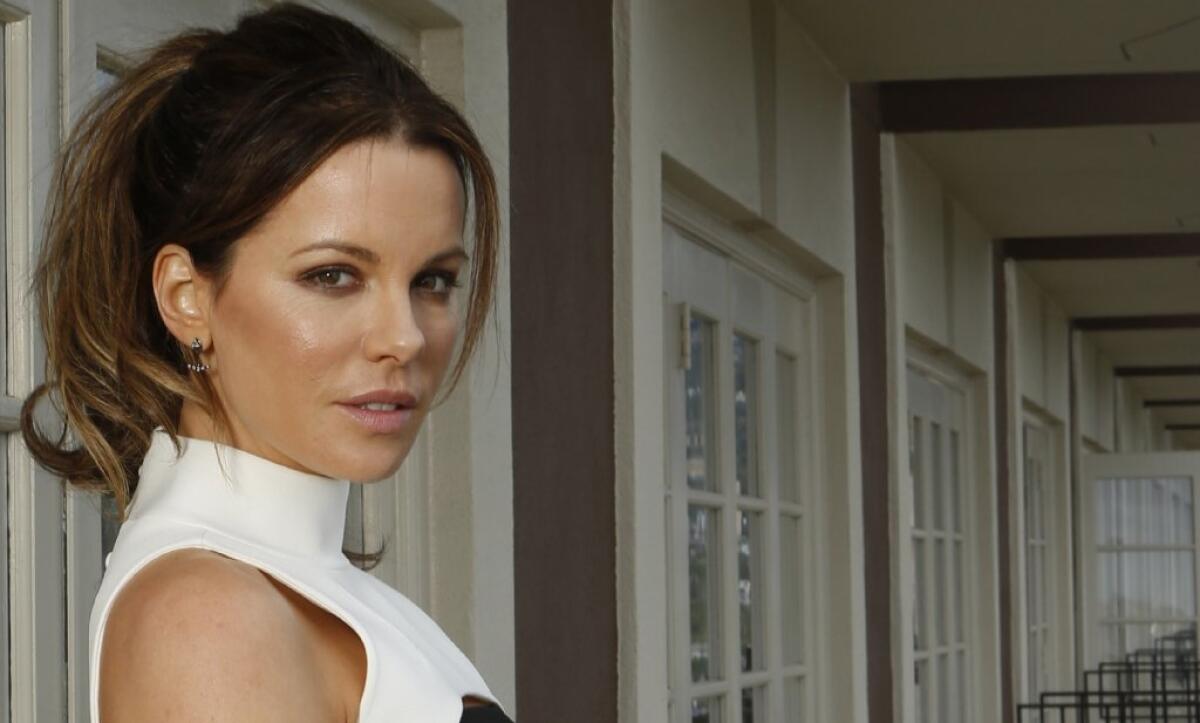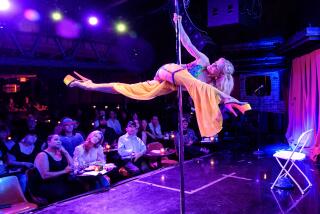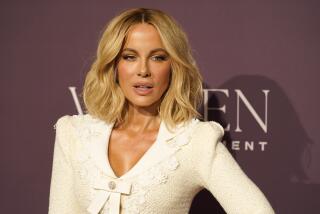Kate Beckinsale sheds the latex for a corset and returns to her roots with ‘Love & Friendship’

When female fans approach Kate Beckinsale in public, it’s often to tell the 42-year-old English actress that she represents a fantasy — of their husbands.
“Women will come up and say, ‘You’re my husband’s hall pass,’ which is a really strange thing to have someone say to you,” Beckinsale said, in a recent interview at a Brentwood restaurant. “I always feel slightly panic-stricken and guilty and implicated, which is my own problem. Then it turns out that the husband is hiding behind a trash can and he was too shy to say anything, and you find yourself in this awkward spot where you’re slightly in a precursor to swinging, when you’ve just been wandering around a store.”
Beckinsale’s come-hither public image has been shaped by her most widely seen films of the last decade or so — action movies such as the “Underworld” series and “Total Recall” that call for her to wear figure-hugging latex costumes and convincingly wield a weapon. Less known are the kind of movies with which she began her career in the 1990s, comedies of manners such as “Cold Comfort Farm,” “Emma” and “Last Days of Disco” that made use of another of Beckinsale’s notable gifts — a cutting wit.
The actress’ latest film, the period comedy “Love & Friendship,” which opened Friday, brings her back to those roots in a performance that’s earning some of the best reviews of her career.
“My character’s got so many constraints on her as a woman because of [the] time period. If she were transplanted to now, she would have a high-powered job and a string of lovers, and she wouldn’t have to put all of her intelligence into finding a husband who’s got money,” Beckinsale said.
In the sophisticated comedy, which Beckinsale’s “Last Days of Disco” director Whit Stillman adapted from a little-known Jane Austen novella called “Lady Susan,” she plays the title character, a charismatic, manipulative widow channeling her guile into finding rich husbands for herself and her daughter. She’s the kind of lovable, hateable, tricky female character that has become an unfortunately rare type in contemporary film.
“I’ve always loved broads, the kind of women Bette Davis and Barbara Stanwyck played,” Beckinsale said. “A woman at the height of her maturity, power, intellect and sexuality. It’s kind of a cool moment in a woman’s life, and I feel like it’s not valued as much as it should be.”
In person, Beckinsale is wickedly funny, with a loud, throaty laugh and a tendency to dart from high topics to low — including the books she’s reading and the cat puke she cleaned up while she was wearing her premiere gown the night before. If there is a broad in this restaurant full of lunching Brentwood women avoiding their bread baskets, it is surely her.
After more than a decade of living in Los Angeles, most recently Mandeville Canyon, she still seems like an English woman on vacation. She doesn’t drive and carries two cellphones — a pink one reserved for communicating with family and friends in England, a silver one for America, on which she gets texts from her 17-year-old daughter, Lily, who has just learned to drive.
Some of Beckinsale’s best scenes in “Love & Friendship” are opposite Chloe Sevigny, who appears as Lady Susan’s co-conspirator in matchmaking and match-breaking. It’s a reprisal, of sorts, of the roles the two actresses played in their 20s, as tube top-clad young New Yorkers in “Last Days of Disco,” with Beckinsale as the stinging queen bee of their social circle. This time they’re in corsets, and Beckinsale is again the alpha.
“Kate is expert at playing this dominant brunette,” Stillman said. “She’s great at the stiletto chops, the knife that is invisible to the victim.”
There has been a directionlessness to Beckinsale’s career choices over the years, as she is the first to admit. Her film selections have been defined less by any kind of professional strategy than by her off-camera life. Shortly after she made her first appearance in American films in “Last Days of Disco,” Beckinsale had her daughter Lily with her longtime boyfriend, actor Michael Sheen. In 2003, she married her “Underworld” director Len Wiseman, with whom she would go on to make several action films before they separated last year.
“My career has reflected my personal life very much,” Beckinsale said. “There was never a plan. It was all me reacting to things. Being a mom rather young, that affected every decision I made. It wasn’t a question of choosing from all the possible movies. First of all, I wasn’t being offered all the possible movies. But there were certain things it wouldn’t have been appropriate to put my kid through.”
Beckinsale was born in London to two actors, and her early life was marked by a very public tragedy when her father, Richard Beckinsale, a beloved star of English sitcoms, died suddenly of a heart attack when she was 5. She went on to study French and Russian literature at Oxford before deciding to pursue her parents’ vocation and, after a few TV gigs, landed a role in Kenneth Branagh’s adaptation of “Much Ado About Nothing” opposite Emma Thompson, who made a strong impression as a cool, independent-minded female role model.
The day they met, the women went skinny-dipping. “Emma said, ‘For this movie, Kate, we’re not shaving our armpits,” Beckinsale said. “Women didn’t shave their armpits in Shakespeare’s time. I didn’t get flying squirrel length or anything, but I did leave them that way for quite a while after the film.”
As a young actress, Beckinsale said she approached Hollywood with arms folded, prepared to be underestimated and oversexualized.
“I was really sensitive to that idea of being exploited as a young girl,” she said. “I had the big boots on and the feisty opinions. I wore a backpack with rubber spikes. I didn’t dress or do my hair in a sexy ingenue way. I wasn’t giving out the signal, ‘If you’re a producer … I’m available.’ I was more, ‘I’ll fight you. And write some angry poems.’”
After a breakout year in 2001, in which she appeared in “Pearl Harbor” and the romantic comedy “Serendipity,” Beckinsale began to let down her guard and see a change in her image, toward a racier persona.
“At 28, 29 I felt like the part I’d kept closed up for my own safety, I could now direct, and within minutes, suddenly you’re in all these sexy photo shoots and you become associated with being sexy, when you weren’t particularly before,” she said. “I couldn’t have handled that earlier on.”
The action movies followed, and with them came the public ideal of the icy vixen — a fantasy woman who bears little resemblance to the real woman.
“The character I’ve played the most is rather frozen and grim and not very expressive,” Beckinsale said. “She’s a cool character but you don’t necessarily want to have her over for an evening and watch ‘Dirty Dancing,’ which, I’m more that girl.”
Beckinsale is tiptoeing out into sharing that side with more people -- she recently got Twitter and Instagram accounts, and took her first selfie. She’s also grappling with the judgement of women’s bodies that she feels has intensified in the 17 years since she had her daughter.
“Historically when women have made strides of some type, culturally things rise up to oppress them,” Beckinsale said. “Right now I feel like we’ve made a lot of strides, but nobody’s allowed to age or look pregnant. I feel all of that stuff has gotten worse. It’s a brilliant way to keep people enslaved, by having them horrified by themselves. Well I refuse to feel shame about being human.”
With her daughter now college shopping, Beckinsale said she is looking ahead to a new phase of life with more freedom. She is co-writing a script, a mother-daughter story, with author Emma Forrest, a childhood friend.
“I will be able to have a slightly more gypsy [lifestyle],” she said. “Any kind of change -- I definitely need to go under the bed and have three panic attacks about it. But soon it’s going to be a little bit more like it was when I did ‘Last Days of Disco.’ If someone says, ‘Do you want to come to India?’ I can say, ‘Yes!’”
More to Read
Only good movies
Get the Indie Focus newsletter, Mark Olsen's weekly guide to the world of cinema.
You may occasionally receive promotional content from the Los Angeles Times.











